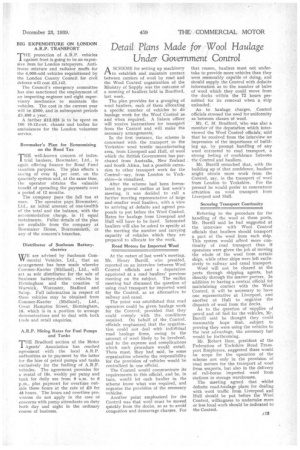Detail Plans Made for Wool Haulage Under Government Control
Page 15

If you've noticed an error in this article please click here to report it so we can fix it.
ASCHEME for setting up machinery to establish and maintain contact between carriers of wool by road and the Wool Control organization of the Ministry of Supply was the outcome of a meeting of hauliers held in Bradford, last week.
The plan provides for a grouping of wool hauliers, each of them allocating a specific number of vehicles to do haulage work for the Wool Control as and when required. , A liaison officer will receive instructions for transport from the. Control and will make the necessary arrangements.
In the first instance, the scheme is concerned with the transport to the Yorkshire wool textile manufacturing area, from Liverpool and Hull, of wool which the British Government has purchased from Australia, New Zealand and South Africa, but a possible extension to other transport work for the Control—say, from London to Yorkshire—is visualized.
After the scheme had been formulated in general outline at last week's meeting, it was decided to call a further meeting representative of large and. smaller wool hauliers, with a view to arriving at definite and agreed proposals to put before the Wool Control. Rates for haulage from Liverpool and Hull will have to be fixed, Interested hauliers will also be asked to specify at the meeting the number and carrying capacity of vehicles which they are prepared to allocate for the work.
Road Motors for Imported Wool At the outset of last week's meeting, Mr. Henry Burrill, who presided, reported on an interview between Wool Control officials and a deputation appointed at a road hauliers' previous meeting on the subject. The earlier meeting had discussed the question of using road transport for imported wool for the Control, as an alternative to railway and canal.
The point was established that road operators could be given haulage work for the Control, provided that they could comply with the conditions ,required. On behalf, of the, Control, officials emphasized that the organization could not deal with individual road haulage firms, owing to . the amount of wool likely to be involved, and to the expense and complications which such procedure would entail. There must, they had said, be some organization whereby the responsibility for the provision of vehicles would be centralized in one official.
The Control would communicate its requirements to this official, and he, in turn, would let each haulier in the scheme know what was required, and organize the provision of the necessary vehicles.
Another point emphasized for the Control was that wobl must he moved quickly from the docks, so as to avoid congestion and demurrage charges. For that reason, hauliers must not undertake to provide more vehicles than they were reasonably capable of doing, and should supply the Control with definite information as to the number of bales of wool which they could move from the docks within the 72 hours permitted for its removal when a ship unloaded.
As to haulage charges, Control officials stressed the need for uniformity as between classes of wool.
Mr. C. M. Bradford, who was also a member of the deputation which interviewed the Wool Control officials, said that he received from the interview an impression of the importance of building up, by prompt handling of any wool entrusted to road transport, a strong feeling of confidence between the Control and hauliers.
Mr. Burrill remarked that, with the building up of that confidence, hauliers might obtain more work from the Control, say, in the transport of wool from London to Yorkshire. For the present he would prefer to concentrate attention on wool transport from Liverpool and Hull.
Securing Transport Continuity Referring to the procedure for the handling of the wool at these ports, Mr. Burrill said he had suggested at the interview with Wool Control officials that hauliers should transport a part of the wool from each ship. This system would afford more continuity of road transport than if operators were given the job of moving the whole of the wool from certain ships, while other ships were left exclusively to railway and canal transport. Wool will not be cleared at the ports through shipping agents, but directly through the master porters. In addition to having a central official for maintaining contact with the Wool Control, it will be necessary to have one representative at Liverpool, and another at Hull to organize the dispatch of wool from the docks. As to the question of supplies of petrol and oil fuel for the vehicles, Mr. Burrill said he thought they could reasonably hope that, subject to proving they were using the vehicles to the hest advantage, the necessary fuel would be forthcoming.
Mr. Robert Barr, president of the Federation of Yorkshire Road Transport Employers, suggested there would be scope for the operation of the scheme not only in the provision of road motors for the transport of wool from seaports, but also in the delivery of rail-borne imported wool from stations to storage warehouses.
The meeting agreed that whilst definite road-haulage plans for dealing with wool traffic from Liverpool and Hull should be put before the Wool Control, willingness to undertake more or less local work should be indicated to the Control.




















































